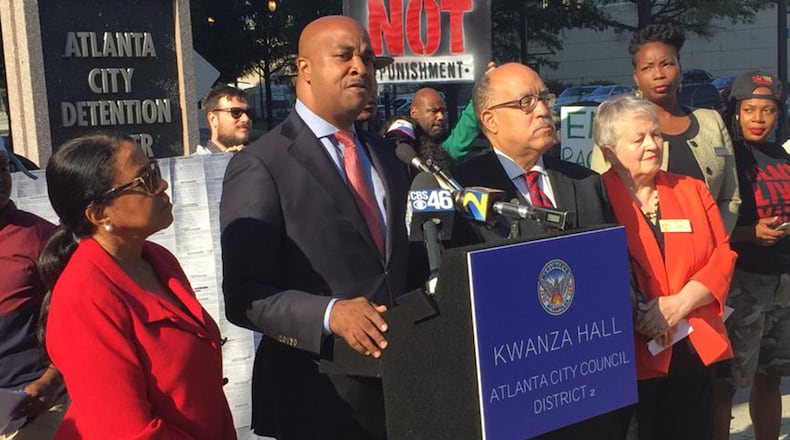The Atlanta City Council on Monday unanimously passed legislation eliminating jail time and reducing penalties on possession of small amounts of marijuana, but not before mayoral candidates got into heated debates and backers of the bill became rowdy.
The legislation, which was resurrected in September after spending months in committees because of concerns it might send the wrong message, brings Atlanta closer to other large cities across the nation that are either lessening penalties on pot or decriminalizing it altogether as Americans' opinions on the drug evolve.
It will reduce the financial penalty for possession of one ounce or less from up to $1,000 to a maximum of $75. Jail time, currently six months for possession, would be eliminated for an ounce or less.
Kansas City, Dallas, St. Louis, Pittsburgh and Nashville are among a growing number of cities that have passed various laws in the past few years allowing residents to possess, grow or share certain amounts of pot without going to jail. They follow the decriminalization of the drug in states such as Colorado, Washington, Oregon and California and in the nation's capital, though cannabis is still illegal federally.
Mayoral candidates Keisha Lance Bottoms, an Atlanta City Councilwoman, and Vincent Fort, a state senator and advocate for changing the law, clashed in a fiery war of words over the legislation. Fort had just made a pitch to the council to pass the proposal when Bottoms asked why he was putting the burden on the city and not the General Assembly.
“Why didn’t you pass this at the state level where it actually could make a difference,” Bottoms asked, later saying her concern is Atlanta residents will not know they can still be arrested and charged by state law for marijuana possession if caught with an ounce or less, despite the Council’s actions.
Fort shot back: “I’m glad you asked that question because if you took the time to send your staff to the computer, you will see that I’m an author of a bill to defelonize marijuana at the state capitol. Don’t try to score political points with me. Because scoring political points ain’t helping those kids over at the city jail.”
“I didn’t ask you what you introduced,” Bottoms responded as Fort kept talking. As Bottoms tried to clarify her statement, Council President Ceasar Mitchell, who is also running for mayor, tried to restore order. That led to a back-and-forth between Mitchell and Bottoms as the packed audience, restless to get on with business, hooted and on several occasions loudly chanted “vote, vote, vote.”
Atlanta City Councilman Kwanza Hall, who also is running to succeed Kasim Reed as Atlanta's next mayor, had pushed the changes in Atlanta's law since spring. He said the legislation was necessary because to address the disparity in the numbers of African Americans arrested for possession.
While white and black Americans use pot at about the same rate, African Americans are arrested and charged at larger rate. Between 2014 and 2016, 92 percent of those arrested for possession in Atlanta were African American and 85 percent were male, according to the Racial Justice Action Center in East Point.
“Today we stand with every parent of Atlanta who is fearful of or has seen their children’s lives destroyed, or careers ruined because of a racist policy that unjustly incarcerated minorities by more than ninety percent,” Hall said just minutes after the passage. “Reforming the racist marijuana laws on the book in Atlanta has been just one in a number of reforms that I have fought for.”
About the Author
Keep Reading
The Latest
Featured



